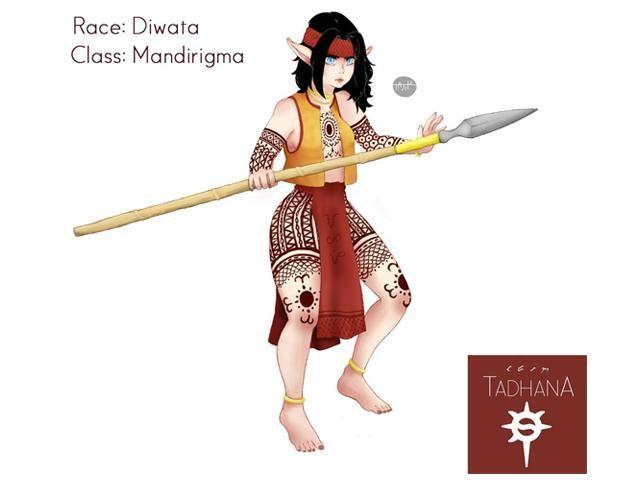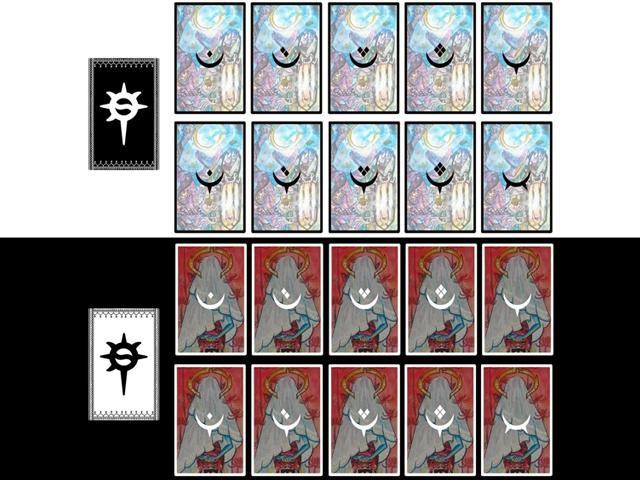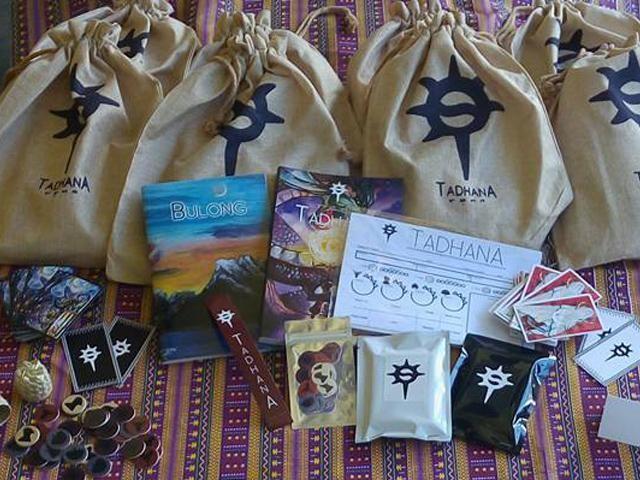‘Tadhana’ is a Filipino tabletop RPG that beautifully encapsulates local myths
Role-playing game (RPG) fans have worn the skin of elves, shed the blood of wyverns, and journeyed across kingdoms as paladins and wizards. We’re always craving spectacular new experiences, which is why it’s a shame there’s a scarcity of extensive fantasy realms populated by Diwata, Engkanto, and Manananggal to explore.
But Philippine mythology is far from new. It forms the very fabric of Filipino culture, so much so that it’s bizarre we’ve produced so few games revolving around our stories, creatures, and values.
Enter Project Tadhana, the all-Filipino game development group behind the tabletop RPG “Tadhana.”
As described by its lead writer and developer John Nathaniel Briones, “Tadhana” is set in “the universe of Kalawakan, which is inspired by Filipino mythology.” As such, it’s more than just a game; it’s an expression of the unique identity we’ve suppressed for so long.
A world given life
Like most RPGs, the story of “Tadhana” is an evolving one. Every new campaign introduces fresh events, characters, and lore. Project Tadhana, however, has already worked out the framework from which new tales both big and small will rise.
For starters, Kalawakan is home to two main gods, Pahla and Goema, who represent the aspects of life and death, respectively. The planet on which your adventures take place is Sekunda, which boasts five major continents, and is orbited by three moons.
The world resembles prehistoric Philippines. Its many regions are uncharted, and magic and spirits abound. Trade between the young civilizations already exists, and there is some interaction with foreign people.
Lahi
Speaking of people, Sekunda’s playable races, or Lahi, should be familiar to Filipinos.
The first six are Tao, Aswang, Engkanto, Diwata, Tikbalang, and Garuda. Each comes with its own unique traits, abilities, history, and culture.
Aswang, for example, can shapeshift into any harmless small animal. They can’t ingest regular food or water, and instead feed on the innards or blood of living creatures. Unsatisfied hunger turns their appearance feral. They reproduce by converting a Tao into an Aswang through a dark ritual.
Come next year, Project Tadhana plans to launch an expansion that will welcome two more Lahi into the mix: the ageless and near-immortal Anito, and the tall, pale, and sexless Tamawo.

From Mandirigma to Minokawa
What good is an RPG without character classes? In “Tadhana,” the professions can be loosely likened to Western counterparts. For now, we have the Mandirigma (Warrior), Pana (Ranger), Sarong (Monk), Albularyo (Druid/Cleric), and Salamangkero (Mage).
Each profession boasts a particular ability set. For instance, the Pana can bond with animals such as boars and crocodiles, whereas the Albularyo can summon spirit companions.
You can further customize your character by giving them additional traits, equipping them with gear, having them pursue a destiny, and having them create magic (in “Tadhana,” every race and profession can wield magic).
These are all governed by systems possessed of astounding flexibility and depth. For instance, magic revolves around “Powers,” which are born of will instead of rituals and incantations, and whose properties are determined by the Four Laws. You can craft your own powers, granting you near-limitless opportunities for creativity.
And of course, you’ll be encountering a variety of gods and monsters, from the ubiquitous Tiyanak and Manananggal, to lesser-known friends like the Tambaloslos and Berbalang, to legendary creatures such as the Tambanokano and Minokawa
No dice!
It’s not just the setting, mythology, and themes that make “Tadhana” special; the game also does away with dice, instead employing a card-based system to resolve battles, social interactions, and the like.
“We use forty cards and employ pairs and three-of-a-kind combinations to determine success and failure of actions in the game,” Project Tadhana explained.
Directly connected to this system are the Trials of Fate, which occur when characters encounter obstacles they must overcome, whether in or outside combat.
“The focus of the system is simplicity and flexibility. We’re especially proud of the mechanics of the Trials of Fate as it can be used to resolve any isolated situation and determine almost any outcome in the game.”
Project Tadhana plans to release a Cards of Destiny instructional video in the future.

Inspiration and inception
The brainchild of Briones, "Tadhana" was previously known as “I Recollect,” the game system that would eventually evolve into what it is today.
Three years after said system’s inception, Briones formed the group Project Tadhana with his friends and close family members. Their goal: the development of a Filipino tabletop RPG.
Two things served as major inspirations for “Tadhana”: gameplay and lore.
“It’s no secret that some of the team members of Project Tadhana are players of ‘Dungeons and Dragons,’ and ‘Tadhana’ is mainly a result of my frustrated love towards the popular RPG franchise,” said Briones.
That frustration was the result of “Dungeons & Dragons” being an extremely expensive hobby. This encouraged Briones to study the Basic Roleplaying System and RPGs such as “Fate” and “Axiom.” He then tried his hand at creating his own dice system.
As an educator, Briones also began incorporating his roleplaying and game mechanics knowledge into his teaching style.
“While the integration of role-playing and the motivation of leveling up skills (which gave special classroom privileges) and defeating bosses (graded recitations) was quite successful at making sure most of my students studied the subject’s material, what I realized was that rules and math tend to get in the way of the experience,” he explained. “This led to the development of another game system that valued simplicity and role-playing over stat checks.”
And so, “after several play tests with friends and family, and a couple of reiterations, the card pairing system was developed.”
While Briones is an admirer of Tolkien’s works, isekai anime/manga, and post-apocalyptic/fantasy hybrids, he has also always been fascinated by Filipino mythology and fantasy. He grew up watching movies like “Magic Temple” and “Pedro Penduko,” and series like “Hiraya Manawari” and “Wansapanataym.” He also loves the Filipino writing system Baybayin.
However, Briones lacked the confidence to incorporate local lore into his own game “for fear of disrespecting (Filipino) culture through ignorance or misrepresentation.”
Then he discovered Neil Gaiman’s “The Sandman” graphic novels, and Kugane Maruyama’s “Overlord” light novels.
“‘The Sandman’ fascinated me with its take on gods and international mythology, while ‘Overlord’ provided insight on how cultural roots and a localized experience of society can affect fantasy worldbuilding even if the framework is based off of Tolkien and Western fantasy standards,” he explained. “These favorites of mine would then inspire me to convert ‘I Recollect’ from a typical medieval fantasy into ‘Tadhana’… (They) helped me understand that it’s all right to take artistic liberty when it comes to worldbuilding as long as there’s proper effort given to research while respect and love is the main focus when paying homage to source materials.”

Your own Adventurer’s Kit
“Tadhana” has already been launched. At the moment, there’s no way to acquire the game online; you’ll have to buy the Adventurer’s Kit — a physical set consisting of the rulebook, starter campaign, Cards of Destiny, counters, and character sheets — from Project Tadhana directly.
One of the best ways to meet Project Tadhana personally is to visit conventions they’re attending, as well as attend live demos they conduct in Quezon City. There are plans to conduct games in Alabang and Las Piñas.
“In the future, we plan to make the rules and campaigns available through DriveThruRPG,” said Project Tadhana.
While the team is currently focused on promoting the game locally, RPG enthusiasts abroad have already shown interest in “Tadhana.”
“We have received several requests for international shipping from tabletop RPG players from other countries, especially from the U.S. and Canada,” said Project Tadhana.
For more information about “Tadhana” and Project Tadhana’s schedule of events and releases, visit their official Facebook page. — LA, GMA News




